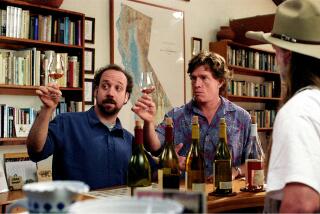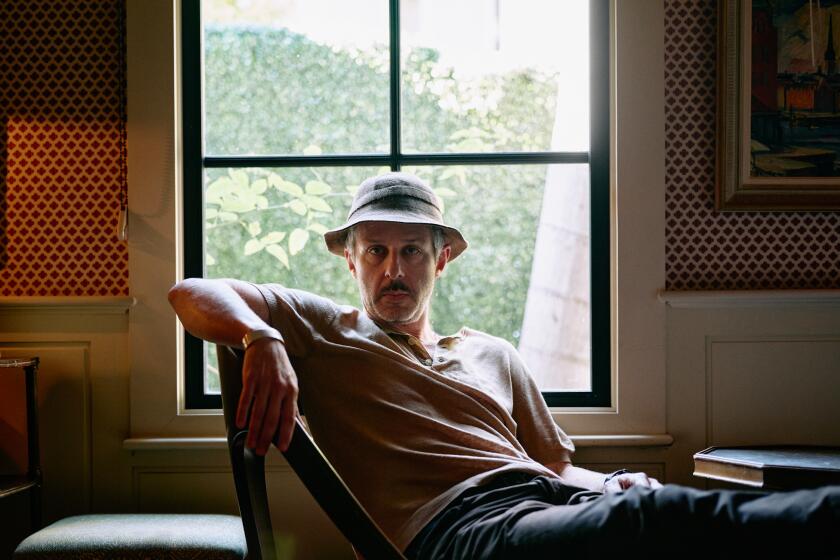Juicy details liven up ‘Mondovino’
People read a lot of meaning into wine, seeing beyond the really expensive fermented grape juice and investing it with religious symbolism and intellectual properties. Wine connoisseurship is often interpreted as a status symbol, and the beverage has been intimately linked with Western civilization and other world cultures for thousands of years. As one interviewee in the documentary “Mondovino” points out, the presence of wine has historically gone in hand in hand with progressive societies, while its absence meant barbarism.
Filmmaker Jonathan Nossiter appears to be a cultured and civilized guy, but don’t let that fool you; he has still managed to craft an entertaining film that is neither stuffy nor pretentious. “Mondovino” lives up to its “World o’ Wine” title, but it’s ultimately about a lot of other things -- globalization, cultural imperialism, the plight of the artist -- as well as being a metaphor-maker’s paradise.
Combining his two careers as sommelier and director -- his “Sunday” won the Grand Jury and screenwriting prizes at Sundance in 1997 -- Nossiter brings a passion and knowledge to the project that raises it above what might have been a mere state-of-the-grape travelogue. Being fluent in the film’s five primary languages -- French, Italian, Spanish and Portuguese, in addition to English -- also didn’t hurt as he shot the film on five continents over three years and was able to interview his subjects in their native tongues.
Nor did the decision to use small, lightweight digital equipment and shoot with two friends, Uruguayan filmmaker Juan Pittaluga and Caribbean-Brazilian photographer Stephanie Pommez.
The intimacy allowed by the small crew is evident in the openness of their subjects. The wine world is a notoriously closed and secretive society, but Nossiter gets wine consultants and winemakers to debate potentially controversial subjects such as the loss of terroir, the special geographic characteristics that give a wine its individuality, and the process of micro-oxygenation, a controlled introduction of oxygen into the wine at precise levels, with vigor and candor.
If the film is any indicator, the wine world is full of interesting characters. Michel Rolland is a jet-setting consultant who expounds on the benefits of modernity in production and seems to know (and be known) everywhere. He’s the link between the New World, Napa-based Mondavi empire and more traditional vintners in Europe.
Although there’s a feeling of inevitability as the Mondavis spread their brand-friendly, marketing-drive style around the globe, Nossiter isn’t necessarily buying into it as he explores centuries-old wineries forging alliances with the Mondavis as well as small independents with only a few acres or less in places as far-flung as Brazil and Argentina.
Though he makes no claim of objectivity, Nossiter also doesn’t ambush his subjects. The interviews are presented in a straightforward and relatively uninflected manner. The sneakiest device he uses is to let the camera roam the walls and desks of people while he interviews them, revealing tiny but interesting details. When the more corporate-minded winemakers come across as doltish or clueless conquerors, it’s a trap of their own making. Michael Mondavi’s fantasy of his children sometime in the future making wine in outer space is one of the funnier moments in the film, but also one of the creepiest. Talk about your Manifest Destiny.
*
‘Mondovino’
MPAA rating: PG-13 for brief pinup nudity
Times guidelines: There’s a scene in which a man crushes grapes wearing nothing but boxer shorts that is a little unpleasant.
A production of Goatworks Films & Les Films Croisade, released by ThinkFilm. Director Jonathan Nossiter. Producers Jonathan Nossiter, Emmanuel Giraud. Associate producer-second camera Juan Pittaluga. Assistant and co-camera operator Stephanie Pommez. Running time: 2 hours, 15 minutes.
Exclusively at the Landmark Nuart, 11272 Santa Monica Blvd., West L.A., (310) 281-8223.
More to Read
Only good movies
Get the Indie Focus newsletter, Mark Olsen's weekly guide to the world of cinema.
You may occasionally receive promotional content from the Los Angeles Times.











